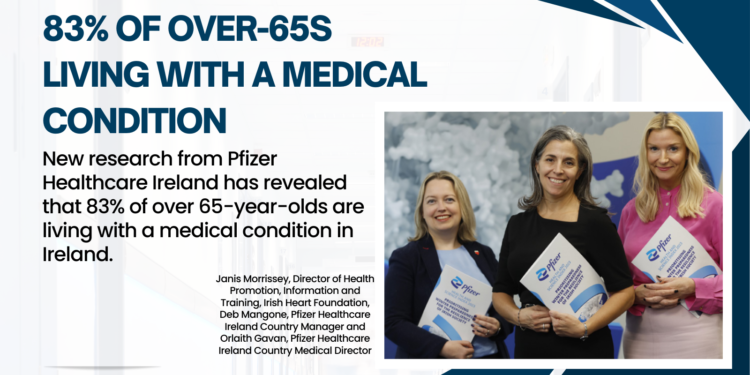The Pfizer Health and Science Index shows that 83% of over 65-year-olds are living with at least one medical condition, while almost one in three are living with either Heart disease, COPD or Diabetes.

In the general population, a higher proportion (60%) of the public are living with an enduring or persistent medical condition. The research found that 60% of Irish adults are living with a medical condition such as arthritis or high blood pressure, with approximately six in ten (59%) of these attending a healthcare facility regularly for treatment or a check-up. Blood pressure (High or low), high cholesterol and depression & anxiety continue to be the most pervasive conditions. The research also revealed that there has been a 14% fall in participation rates in public vaccination programmes (not including the COVID-19 vaccine) in the past year.
The research, carried out by Behaviour and Attitudes, also indicates that a positive learning from the pandemic is the public’s positivity towards further utilising pharmacies for expanded healthcare services such as vaccinations. The percentage of the population endorsing utilising community pharmacies for expanded healthcare services increased from 29% in 2022 to 41% in 2023.
The research results also show that most have experienced flu at some stage while over a third
(36%) have experienced it over the last two years. COVID-19 has been particularly invasive with over three in five suggesting they have had the disease over the past two-year period.
COVID related conditions such as long COVID have had a severe impact on adults’ ability to work and higher numbers (56%) are seeking private treatment for COVID-related conditions, highlighting the importance of the COVID-19 booster programme this winter.
Many feel that the lack of access to healthcare services during the pandemic has resulted in their condition deteriorating. 36% of people living with a medical condition believe that they have been negatively affected over the past couple of years due to a lack of access to healthcare professionals, with a quarter also believing that their condition has worsened due to a lack of access to diagnostics. Two in three adults who have experienced delays in accessing healthcare state that delays in access made them less likely to seek healthcare treatment.
Pfizer Healthcare Ireland called on the public at the launch of the annual Pfizer Health and Science Index to ensure that they are prepared this winter by attending appointments and availing of vaccines to minimise personal risk and to avoid putting undue pressure on the health system.
This year’s Index also asked the general public about their opinions of the Irish healthcare system. Almost half (47%) of adults believe that health outcomes have improved over the last decade and in the event of developing a serious illness, two thirds (66%) of adults have confidence in the medical care they would receive. Looking at how the cost-of-living crisis and its potential impact on healthcare services, household budgetary pressures has led to an increased trend of people putting off going to the doctor, with almost a quarter of adults (24%) admitting that they decided against a visit due to financial concerns.
Commenting on the 2023 Pfizer Health and Science Index findings, Deb Mangone, Pfizer Healthcare Ireland Country Manager, said, “With research showing that more than 80% of those aged 65 and older are living with an enduring or persistent medical condition, this is a key time of year for maintaining our health. There is additional pressure put on the health system during the winter, and it is imperative vulnerable and older people protect their health. As we enter the winter period, we strongly urge the public, particularly the most vulnerable, to attend all medical appointments and take the necessary precautions to protect their health this winter.”
Janis Morrissey, Director of Health Promotion, Information and Training, Irish Heart Foundation,
Janis Morrissey, Director of Health Promotion, Information and Training, Irish Heart Foundation, Deb Mangone, Pfizer Healthcare Ireland Country Manager and Orlaith Gavan, Pfizer Healthcare Ireland Country Medical Director
commented, “People continue to be worried about heart disease with 45% of Irish adults indicating that they worry about developing heart disease as they age. Fortunately, up to 80% of cardiovascular disease is preventable and people can take action to do so. Taking proactive lifestyle steps such as controlling blood pressure and cholesterol levels, maintaining a healthy weight, eating a healthy diet, getting regular exercise, limiting alcohol intake, and not smoking. These steps towards maintaining a healthy lifestyle are even more important for older people and we would strongly recommend all older people to ensure they attend all healthcare appointments and take the necessary precautions to protect their health.”
Orlaith Gavan, Pfizer Healthcare Ireland Country Medical Director said, “This year’s research shows the importance of older people taking precautions to protect their health this winter with the results indicating that 83% of over 65-year-olds are living with a medical condition. We know that over 65 years old are more likely to be negatively affected by winter respiratory illnesses and those living with a medical condition are even more vulnerable to these illnesses. We would urge those people in this vulnerable cohort to take the necessary precautions to protect against respiratory illness this winter.”
Looking at the public’s attitudes to science, over half (56%) of Irish adults believe that people leaving university with a STEM (Science, Technology, Engineering and Maths) qualification have a better chance of getting a job than those with a non-STEM qualification. Given the significant presence of STEM multinationals in Ireland, 35% of the public believe that there are more job opportunities in these sectors in Ireland, compared to other countries. From an educational perspective, three quarters (76%) of adults would like to see more of a focus on science at primary school level. In terms of societal benefits, four in five agree scientific research has significantly improved health outcomes.










